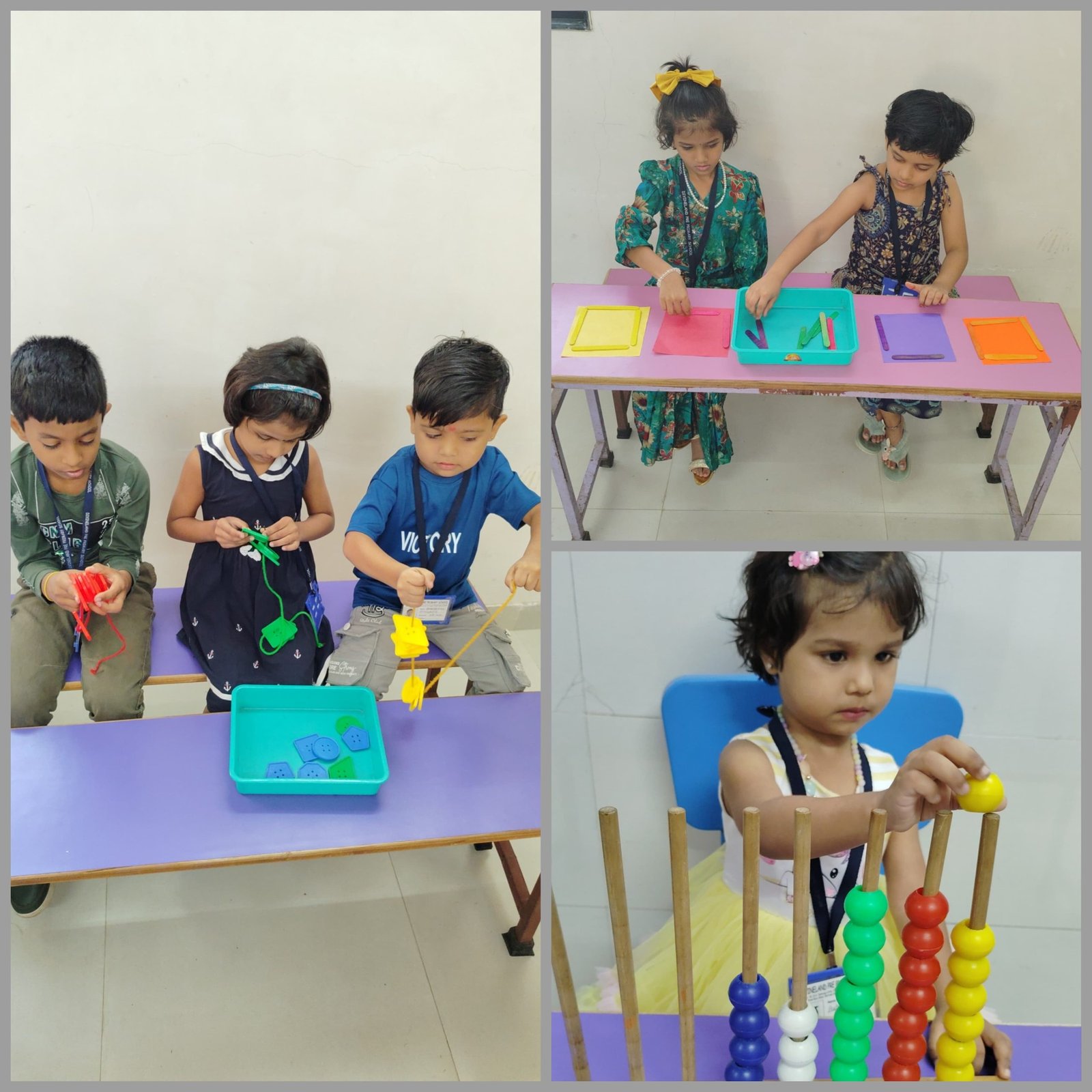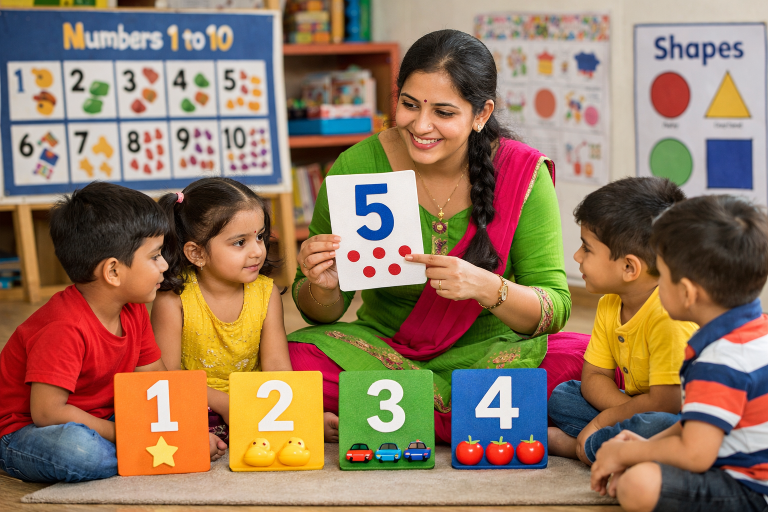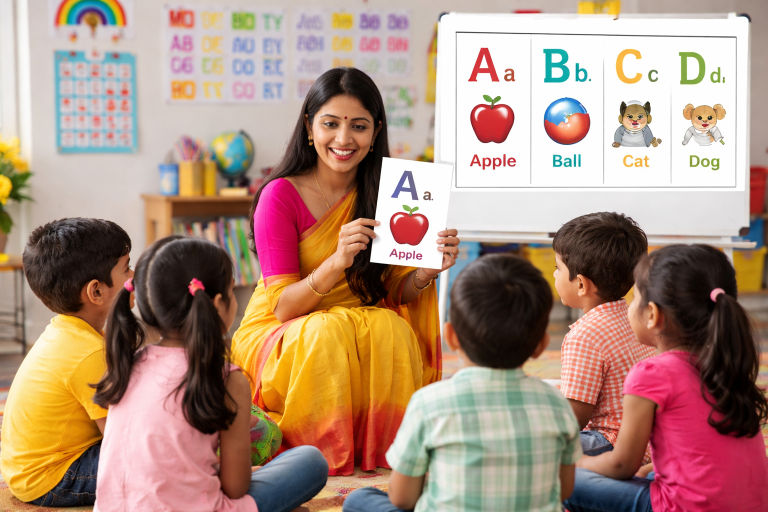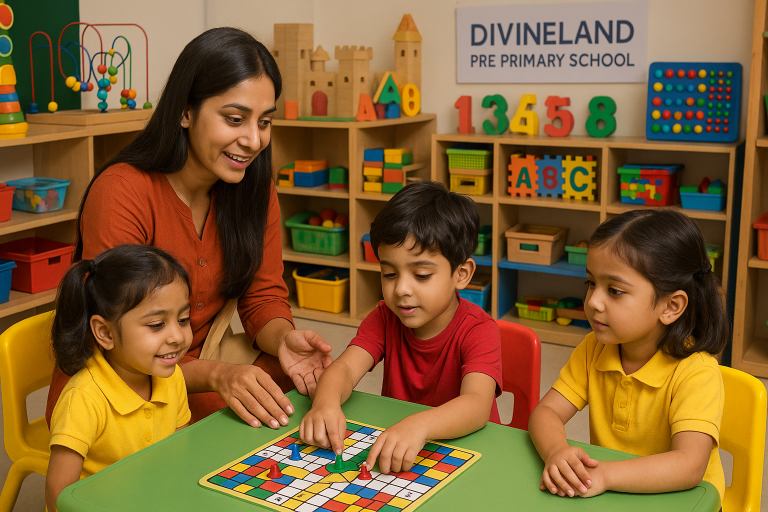
Play has a unique role in early childhood education. Play is not a holiday from school work-it helps the child acquire the most important skills such as problem-solving, creativity, and communication. All through the different types of play such as fantasy play, physical play, and group play, the early learners develop confidence and improve their communicative skills.
The Importance of Play also extends to academic growth, as it lays the foundation for learning subjects like math, science, and language in a natural, engaging way. By recognizing the importance of play, parents and educators can create a supportive environment where children thrive emotionally, socially, and intellectually.
To enroll in DPPS, Call / Whatsapp on +919082778593 / +918591021373.
Click Here, to download the brochure!
Cognitive Development Through Play
Cognitive development is one of the greatest benefits of play. Children develop naturally by experience, and curiosity, and practical experience, and all these are natural in play. Different types of play stimulate brain functions and aid reasoning, and memory, and critical thinking.
Improving Problem-Solving Skills
While children engage in puzzles, building blocks, or maze games, they encounter challenges that necessitate them to think independently and come up with their own solutions. In the end, their analytical skills and ability to make independent decisions improve their performance.
Developing Creativity and Imagination
Imaginative play, such as playing house, doctor, or role-playing real-life activities, allows children to use their imagination to create new situations. Imaginative play not only builds creativity but also encourages flexibility of thought, which is required for adaptation to new experience.
Developing Concentration and Memory
Rule-based and sequence games, such as board games or memory matching, require children to listen, pay attention, and recall. These activities improve attention span and recall of memory, which are necessary for academic success.
To enroll in DPPS, Call / Whatsapp on +919082778593 / +918591021373.
Click Here, to download the brochure!
Social and Emotional Growth
Play is not only crucial to mental development, but it is also useful for learning social and emotional skills. Kids learn how to coexist with other individuals, express feelings, and consider other people’s perspectives through playing. All of these contribute to learning the abilities to build relations and social accommodation.
Developing Communication Skills
Play provides children with channels through which to communicate their ideas and emotions, either verbally like in the narration or non-verbally through role-playing activities. This helps in language development and increases their expression clarity.
Developing Teamwork and Cooperation
Most forms of play, such as group games and group work, require children to cooperate, communicate, and share turns. In the process, they learn to appreciate teamwork, patience, and consideration for others.
Emotional Awareness
Role-playing or imaginative play enables children to recognize and understand different feelings in themselves and others. This fosters empathy and emotional intelligence, which are vital in maintaining sound relationships as well as managing emotions.
Physical Development and Coordination
Physical activity is a significant aspect of play that offers a child with general health and motor skill development. Movement play provides the child with chances to gain strength, balance, and coordination as well as establish a healthy way of life.
Gross Motor Skill Development
Outdoor play such as running, jumping, climbing, and sports develops large muscle groups, enhances balance, and enhances coordination.
Fine Motor Skill Development
Movements requiring small, specific actions—such as drawing, cutting with a pair of scissors, or doing things with very small objects—help the growth of hand-eye coordination and hand dexterity needed for writing and other tasks in daily life.
Fostering Active Life
If children participate in active play, they develop an open mindset to activity, thus lowering the threat of a sedentary life and ensuring wholesome wellness.
To enroll in DPPS, Call / Whatsapp on +919082778593 / +918591021373.
Click Here, to download the brochure!

Learning Through Play-Based Education
The use of play in early learning facilitates the establishment of an engaging and effective learning system. Most education methods employ play-based learning because of the enhanced retention of information and fun in learning for children.
Improve Language and Literacy
Play activities like hearing stories, singing songs, and playing linguistic games expose children to language in a fun way, broadening vocabulary, pronunciation, and understanding levels.
Introduction to Mathematical Concepts
Counting numbers, sorting shapes, and playing with number puzzles help develop early math abilities in a tangible manner, making the abstract realities more tangible.
Encouraging Curiosity and Discovery
Sensory play, science experiments, and the arts encourage children to ask questions, experiment, and explore new ideas, instilling a lifelong passion for learning.
By including play of structured and free forms in the daily routine, teachers and parents can confirm that kids will enjoy learning and acquire important life skills. Recognizing and validating the significance of play during early learning helps children grow well-rounded, laying the foundation for academic success and beyond.
To enroll in DPPS, Call / Whatsapp on +919082778593 / +918591021373.
Click Here, to download the brochure!
Gorai’s Top Preschool
Finding the right preschool is crucial for a child’s early development, and Gorai’s Top Preschool, Divineland Pre Primary School, stands out for its excellent learning environment. With a focus on nurturing young minds, this preschool blends academics with creative and physical activities, ensuring a well-rounded foundation for children.
Major Facilities of Divineland Pre Primary School:
Play-Based Learning Process
Realizing the importance of play, the school incorporates participative activities that make learning fun and fruitful. From story time to activity-based crafts, children learn essential cognitive and motor skills.
Safe and Stimulating Environment
The classrooms are planned to be child-centered, with safety and exploration encouraged. Colourful and interactive setups make learning areas vibrant and welcoming.
Experienced and Caring Educators
The teaching staff at Gorai’s Top Preschool are well-trained in Early Childhood Education, fostering a positive and encouraging atmosphere for young learners.
Holistic Development
The school strikes a balance between academics and music, arts, and physical education so that children develop emotionally, socially, and intellectually.
Parent Engagement Programs
The school believes in good parent-teacher relationships and conducts interactive sessions and updates to engage the parents in their child’s learning process.
By emphasizing the importance of play, Divineland Pre Primary School ensures that children develop creativity, teamwork, and problem-solving skills from an early age. With its well-structured programs and nurturing environment, it truly stands out as Gorai’s Top Preschool, providing a strong foundation for lifelong learning.
Give your child the best start—enroll them at Divineland Pre Primary School today!
To enroll in DPPS, Call / Whatsapp on +919082778593 / +918591021373.
Click Here, to download the brochure!
Importance of Play in Early Education
FAQs
Why is Play Important in Early Education?
Play assists children in learning problem-solving, creativity, and social skills by rendering learning enjoyable and interesting and establishing a strong basis for future academic achievement.
How does Play Support a Child's Learning?
Children learn math, language, and science naturally with play, gaining cognitive skills, communication, and emotional development without any stress.
Where Do I Get a Preschool that Focuses on Play-Based Learning?
Divineland Pre Primary School, Gorai's Premier Preschool, believes that play is a key factor in providing a caring and stimulating environment for the overall development of your child.


